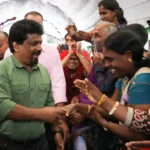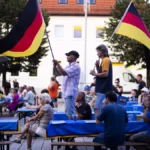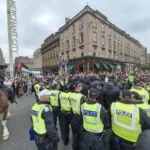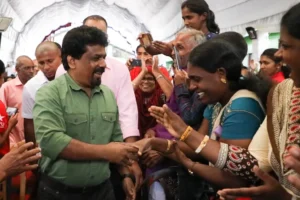With 464 participants, the next Synod, which begins on October 4th, is likely to be one of the busiest ever. So much so that the venue had to be moved from the so-called Synod Hall to the Paul VI Hall, the one used for the Pope’s audiences.
Those who will be in the Synod Hall have very diverse backgrounds. But when the first provisional list was published by the Holy See Press Office, Italian journalists were the first to point out the most surprising name on the list: Luca Casarini, an Italian layman, one of the special guests personally chosen by Pope Francis. “Here are some groups of people dedicated to rescuing people by boat. I invited one of them, the director of Mediterranea Saving Humans, to the Synod. They tell you terrible stories,” said Pope Francis on September 23rd, during the interview on the papal flight back from Marseille, referring to Mr Casarini.
Casarini himself was probably the first to be surprised by the Pope’s invitation. In an interview this July with the Italian newspaper La Stampa, he said he stopped going to church when he was 12. Nothing strange, as it has often happened to many Italians. But if the Synod on Synodality is intended to sketch the profile of the Church of the future, as its promoters have so often said, the question is: what contribution will Casarini be able to make to the Synod, speaking about something he does not know and has no experience of?
Casarini, to be fair, said in the interview quoted above that he felt he was “the last of the last” and is going to the Synod “to listen, not to teach”. But the fact that there is also a chair for someone with such a questionable personal history remains surprising, to say the least.
Casarini, now 56 years old, is a far-left political activist. His name was almost unknown to Italians until the G8 summit held in Genoa in July 2001.
Even then, the G8 summits were accompanied by huge protests by the no-global movement. Silvio Berlusconi, the famous businessman and political leader who has died a few months earlier, had just won the elections and formed a centre-right government that would rule until the next elections in 2006. He saw the G8 in Genoa as an opportunity to consolidate his prestige as a political leader abroad. This made the protests even bigger and stronger.
Many of the anti-G8 associations in Genoa were united in the ‘Genoa Social Forum’. Casarini, on the other hand, was the leader of the so-called ‘White Suits’. Two months before the G8, during a press conference in Genoa, he launched a kind of war declaration to ‘the powerful of injustice and misery’. He also announced that he would disobey any measures taken by the authorities to ensure the safety of the G8 participants.
The white suits then merged into another movement, the ‘disobbedienti’ (the disobeying people), led by Casarini. One of their slogans, in preparation for the G8 in Genoa, was ‘we will break through the red zone’, i.e. the area of Genoa cordoned off by the police to protect the heads of state and government.
The G8 in Genoa was marked by many violent protests, culminating in the death of a young boy named Carlo Giuliani. He was throwing a fire extinguisher at a policeman in a vehicle. Then the policeman, in self-defense, fired the bullet that killed Giuliani. The policeman, Mario Placanica, was tried and acquitted for ‘legitimate use of his weapon’. But in 2006 the senators of Rifondazione Comunista, a far-left party, named a room in the Italian Senate building after Giuliani.
For two days, Genoa was ransacked by numerous violent groups who mixed with the demonstrators. But it must be added that, many years later, the Italian judiciary also convicted 25 police officers and agents for the violence that took place in a school in Genoa against many anti-G8 demonstrators.
Luca Casarini’s political career has never stopped since then, even if without any relevant peak. He came from a high school for plumbers and heating technicians, then he attended the Faculty of Political Science, but never graduated. When he was a young man, he was a frequent visitor to social centres in the Venice area.
Social centres are places where people involved in politics—especially on the extreme left—meet, live and organize cultural and leisure activities, but also political events of various kinds. They are often set up in places that are illegally occupied, without the permission of the owners and without paying rent, water, or electricity (even Casarini has lived for 12 years in an illegally occupied house). In Rome, for example, in the centre of the city, there is a building occupied by a social centre, Spin Time, whose electricity was cut off four years ago because no one paid the bill. At that time Cardinal Krajewski, now Prefect of the Dicastery for Charity, went to Spin Time and, remembering that he had been an electrician as a young man, removed the seals that were blocking the electricity supply to the entire building.
One of the most prominent questions on Google about Luca Casarini is about his employment. Although he has been a well-known figure for decades, and has fought countless political battles, dedicating time and effort to them, he has never held public political office with a salary. However, his views on faith and the Catholic Church have been reported by various journalists in recent weeks.
In the interview with La Stampa, he describes himself as “not Catholic, but Christian…” He is baptized and as a child also received First Communion and Confirmation. Although later, he says, “the relationship with the church broke down, I have always felt Christian, and I consider Jesus the greatest revolutionary of all time”. But he also specifies, “I don’t go to confession or parishes, I am not very liturgical.”
In his long political militancy, there has been no lack of meetings and friendships with priests. In the archives of newspapers and agencies, there are many photos that portray Casarini together with Fr. Vitaliano della Sala, one of the best known priests in Italy as a “rebel priest” or “disobedient priest”, very close to the no-global movements. In 2000, he set up a nativity scene with baby Jesus in his church next to a smashed McDonald’s window.
Today, however, Casarini is a good friend of another Italian priest, Fr. Mattia Ferrari, 29, famous in the newspapers as the chaplain of Mediterranea Saving Humans, an NGO involved in rescuing migrants in the Mediterranean Sea. Fr. Ferrari is also very active inside the Spin Time social centre in Rome, where on May 26th Cardinal Michael Czerny, Prefect of the Dicastery for the Service of Integral Human Development, went to celebrate Mass to mark the fifth anniversary of Fr. Mattia’s priestly ordination.
The NGO Mediterranea Saving Humans has become Luca Casarini’s second life; since 2019, he has been an activist of this NGO. Mediterranea Saving Humans owns the ship “Mare Jonio”, which carries out rescue operations at sea for irregular migrants travelling from the North African coasts to Italy.
Through Mediterranea Saving Humans and Fr. Ferrari, Casarini has become a friend of Pope Francis and then a member of the upcoming Synod. He was also in Marseilles recently for the ‘Rencontres Mediterranéennes’, focused on migration, with the final intervention of Pope Francis.
Meanwhile, Casarini is still in trouble with the law. His phone was tapped while he was talking about drinking champagne to celebrate 125,000 euros, paid by the owners of the Danish tanker Maersk Etienne to Mediterranea Saving Humans, as a kind of “agreed fee”—according to the public prosecutor’s office in Ragusa (a city in Sicily)—for the transfer of 27 migrants from the tanker to the ship Mare Jonio, which then took them to Italy on September 11, 2020. The public prosecutors seized the money last December. And among the eight NGO activists now under investigation for aiding and abetting illegal immigration, there is also the name of the old “disobbediente”, who is expected to be a prominent guest at the Vatican in a few days.
In accepting Francis’s invitation, Casarini has made a weighty commitment, since the 2023 Synod will be followed up in 2024. The hope, at least in terms of style, is that he will not be forced to divide his time between the Paul VI Hall and the Tribunal.
Source : The Catholic World Report
















